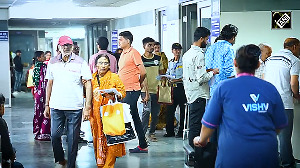With India embracing the World Trade Organisation's guidelines on various trade-related matters, the patents issue has come under the spotlight.
Will the prices of live-saving and other drugs rise in this new regime? How will Indian pharmaceutical companies be affected by the new rules?
rediff.com looks at all these issues in a special series. But first, just what are patents?
A patent is a kind of intellectual property right (IPR).
It allows rights (including exclusive manufacturing and marketing rights) pertaining to an object (product) and/or a means (process), with a view to rewarding the invention.
The government mandates a patent right for the inventor of the product or process. Since a patent right is trade-related, the relevant norms under the Trade-related Intellectual Property Rights (TRIPs) agreement of the World Trade Organisation should apply to patent systems of WTO member countries.
Being a member of WTO, India is mandated to make its patent-related laws (the Patent Act 1970) and other trade-related IPR laws (like those related to copyright, geographical indications etc.) in conformity with the TRIPs norms.
What is a Patent?
A Patent is an exclusive monopoly granted by a government to an inventor over his invention for limited period of time.
Who can obtain a Patent?
An inventor or any other person/company assigned by the inventor can obtain the patent over his invention.
How is a Patent obtained / filed?
The inventor or his assignee obtains a patent by filing an application with the patent office in the stipulated forms as required by the Patent act of that country.
Are patents global or national?
Patents are technically national, given that the designated authority in each country grants patents in that country. But with many multilateral agreements, like TRIPs, Patent Cooperation Treaty (PCT) and Substantive Patent Law Treaty patenting systems are increasingly being globalised.
An international patent search/examination system mooted by the World Intellectual Property Organisation may even bring a confluence of the decision-making processes in many countries.
In future, a particular patent application filed under the PCT in many countries simultaneously might get examined and decided upon with a greater degree of cohesiveness among the national patent authorities.
For how many years does a patent remain valid?
TRIPS mandates a 20-year patent protection. India, too, allows the same duration.
What distinguishes a product patent from a process patent?
The difference is in the name. A product patent allows rights (including exclusive manufacturing and marketing rights) relating to the object, while a process patent relates to a means.
A product patent grants more benefits to the owner.
Who is responsible for ensuring that the patent has not been infringed?
It is the sole responsibility of the patentee (the person to whom a patent is granted, by the appropriate authority the patentor) to see that his patents are not being infringed upon by someone else. It is the patentee's duty to file a suit of infringement against the infringer.
Does a Patentee get money once a patent has been granted to him? Can a patent be sold?
A patentee does not get any kind of money over the grant of the patent. However, when a patentee sells his patented invention to a third party, he gets money.
The patentee has all the rights to sell or transfer his invention exclusively and / or non-exclusively to any person / party or he may choose to sell his invention for royalty. This can be done under a voluntary licence.
The granting authority will not give any money to the patentee. The inventor has to spend lot of money to get the patent rights over his invention and also to spend lot of money to maintain his patent.
What about the recent amendment to the Patents Act?
The basic objective of the recent amendment to the Patent Act was to introduce product patenting in three sectors -- pharmaceuticals, agrochemicals and food.
This was under the TRIPs obligation to introduce product patenting in these sectors, latest by January 1, 2005. So far, only process patents were allowed in these sectors in India.
Has the Patent Act been amended earlier?
Yes, the Act has been amended twice -- in 1999 and 2002. In 2001, the provision of exclusive marketing rights (EMRs) was introduced. This was a transitional arrangement till the introduction of the TRIPs-mandated product patents in pharmaceutical, agrochemicals and food sectors. Under TRIPs, product patenting was required to be introduced by WTO members effective from 1995.
Many developing countries, including India, however, were given a 10-year grace period for introduction of product patenting in these sectors, that is, till 2005.
What is a compulsory licence?
Compulsory licenses are licensees that are granted by a government to use patents, copyrighted works or other types of intellectual property. Compulsory licenses are an essential government instrument to intervene in the market and limit patent and other intellectual property rights in order to correct market failures.
Compulsory licences can be invoked if the government, in the case of a national emergency or otherwise feels reasonable requirements of the public with respect to the patented inventions have not been satisfied and the invention is not available for the public at an affordable price.
What other options are there to prevent patent misuse?
The government can revoke a patent where it is found to be mischievous to the state or prejudicial to the public. It can also acquire a patent to meet national requirements.
In order to facilitate production and marketing of patented products after the expiry of the term of patent protection, preparatory action by persons other than the patent-holder can be allowed.





